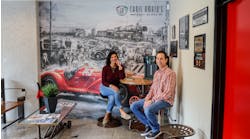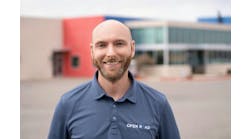Capturing an overall 4.8-star satisfaction rating on a scale of five, a constant string of enthusiastic online customer service reviews are augmented by a steady stream of industry and media praise for her professionalism and efforts at bringing practical and plain-spoken vehicle knowhow to the motoring public.
In addition to being recognized as the first Female Service Shop Owner of the Year in 2011 by the Car Care Council’s Woman’s Board, honored as a Standard Motor Products Tech of the Year and named New York City’s Small Business of the Year by Mayor Michael Bloomberg, Fordin consistently receives positive local and national publicity for her “Women Auto Know” consumer education program. The long list of high-profile appearances includes conversing with host J.J. Ramberg on MSNBC’s “Your Business,” along with numerous other TV, radio, newspaper and magazine accounts featuring Fordin’s industry leadership endeavors.
Fordin’s advice-based customer service philosophy comes from the concept of “telling, not selling.” Although it may seem counterintuitive (the shop does no advertising, but does post a strong social media presence), this lack of a sales push has proven to be a roaring success at drawing people in. And the performance of Fordin and her crew keeps them coming back while spurring glowing word-of-mouth recommendations to friends and family. Another frequently cited plus from the multi-cultural Queens neighborhood is the staff’s ability to speak jargon-free in Greek, Spanish and Korean.
“I teach people about their cars,” Fordin explains. “I’m not seeking them; they are seeking me. It’s easy by practicing good service. We are in a service business, not a sales business. It’s the relationships that we survive and thrive on.”
Monthly Women Auto Know workshops, in which women (and men, too) visit the full-service shop for fun and informative instructional sessions, remain hugely popular.
“It’s caused quite a stir,” says Fordin, who is taking the campaign on a national rollout. “Through education, community feedback and peer-to-peer support, we provide women everywhere with the confidence needed to save money and increase automobile performance.”
Memberships are free for consumers, and other shops are invited to take part in exchange for a modest annual stipend. Training videos have been produced, and there is a line of Women Auto Know merchandise being marketed to help offset the costs.
“We comprehensively understand the fact that for most people, a vehicle is their second-biggest investment next to a home. It makes sense to take the time to select an auto repair facility that will take the best care of your investment. Meeting the needs of the majority 65 percent of the market is good for business,” says Fordin, referring to the growing buying power of female vehicle decision-makers. “It’s good for the people, and it’s good for the industry. That’s a win-win-win — all based on a pledge organically created by listening to and hearing what our customers so desperately ask for. The message is transparent education.”
The theme is further carried forward by the shop’s non-participation in any direct repair program (DRP) affiliations. “I feel that people are often skeptical when it comes to having their car repaired,” she says. “It’s easier to explain that they are my boss. I am here to take care of them. I work for them.”
According to Fordin, it is especially important for the customers “not to think that I am cutting corners, not fixing something or using a specific-brand part because I work for the insurance company. If we touch it, we guarantee it.”
Cordial relations with insurance providers are facilitated by Great Bear’s assortment of lean production strategies, which include paying close attention to details, precise bookkeeping and thorough preparation. Discounted car rentals are arranged in-house, and the vehicles and estimates are available and fully ready for the next step in the process when the adjuster arrives.
“The way we check a car is systematic, like a clock. It’s always the same way each time to prevent error or oversight,” Fordin says. “We have weekly meetings to talk about how we can be better. We try. It is an ongoing process.”
Customers can view damaged components both before and after the repairs are made, and emailed communications are sent out with updates on the progress of the job: “If you are going to pay for it, we will educate you about it.”
Family atmosphere
Free coffee and Wi-Fi are provided at Great Bear, along with a children’s play area in the waiting room. A family atmosphere is fostered among the staff to encourage direct communication and a cooperative spirit.
“They buy into the philosophy of ‘tell, not sell — service, not sales,’” Fordin says. “It’s a feel-good system that instills pride, and I believe that’s directly related to quality.”
The technicians pursue ongoing ASE certification levels, and longevity is encouraged via a sense of close-knit camaraderie. When an opening does occur, motivated interns with a positive, friendly attitude are recruited from local trade schools — “and then I retrain them,” she quips.
Fordin eagerly embraces new technology at the shop, and is gearing up to host a charging station for hybrid and electric cars. Switching to waterborne paint is another forthcoming initiative.
Active in the Girl Scouts, Fordin also encourages young women in foster care who are aging out of the system and considering a career in the repair industry.
A clear path
Great Bear was born in 1933, established by Fordin’s great-grandfather, Oscar Fordin, and his four sons: Herbie, Sidney, Jerry and Larry. Larry Fordin was Audra’s grandfather; her father, Bill, later assumed ownership of the operation, and Audra began her auto repair career at a young age.
“I went into the shop and worked with my grandpa and dad during vacations and on Saturdays. It was fun,” Fordin recalls, adding that her own children, ages 13, 11 and 6, are displaying a similar affinity for the business — which has remained at the same “off the main drag” Sanford Avenue location since it was founded.
“My dad didn’t take it easy on me,” Fordin admits. “He gave me opportunity and made me be accountable. Nothing was just handed over. I had to work very had to prove myself, and earn respect in the industry.”
A critical challenge for the enterprise emerged when the Great Recession hit, and Great Bear’s bottom line fizzled, leaving Fordin with the task of getting things back on track.
“In my early years, when my dad owned the shop straight through to when I took over as owner, the community we served and our business was strong,” she says. “It was the plethora of issues brought on by the recession that changed the business dynamics.”
In 2007, says Fordin, it became apparent that “I needed to reengineer the process when the recession hit.” She embarked upon a self-developed plan that encompassed five elements known in-house as “The Rs”: Recession, Research, Reengineer, Rebuild and Revive.
“While I was reviving my shop, I became enlightened,” she reports. “I found the disconnect in the auto industry, and my path has been crystal clear ever since.”
Fordin realized that many female vehicle owners lacked the necessary knowledge for dealing with repairs and related automotive issues, and that the whole scenario intimidated them. It was a situation that she set about to remedy. “The Women Auto Know movement is not an option,” she says. “It is an imperative to meet the current demand of our motoring society.
“I don’t care what type of vehicle you put in front of me. It can be a car, van, truck or SUV. It can be any make or model and cost $100 to $200,000,” she concludes. “The fact is, all cars have some very important things in common, and I’m going to lay them on the line.”

